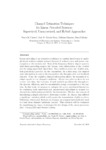Channel estimation techniques for linear precoded systems: Supervised, unsupervised, and hybrid approaches

Use este enlace para citar
http://hdl.handle.net/2183/15454
Excepto si se señala otra cosa, la licencia del ítem se describe como Reconocimiento-NoComercial-SinObraDerivada
Colecciones
- Investigación (FIC) [1685]
Metadatos
Mostrar el registro completo del ítemTítulo
Channel estimation techniques for linear precoded systems: Supervised, unsupervised, and hybrid approachesFecha
2011-07Centro/Dpto/Entidad
Facultade de Informática, Departamento de Electrónica e Sistemas, Grupo de Tecnoloxía Electrónica e Comunicacións (GTEC)Cita bibliográfica
Castro-Castro, Paula-María, García-Naya, J.A., Dapena, A. & Iglesia, D. 2011, "Channel estimation techniques for linear precoded systems: Supervised, unsupervised, and hybrid approaches", Signal Processing, vol. 91, no. 7, pp. 1578-1588.
Resumen
[Abstract] Linear precoding is an attractive technique to combat interference in multiple-input multiple-output systems because it reduces cost and power consumption at the receiver. Frequency division duplex systems with linear precoding acquire the channel state information at the receiver side by using supervised algorithms. Such methods make use of pilot symbols periodically provided by the transmitter. Next, this channel state information is sent to the transmitter side through a low-cost feedback channel. Thus, the available channel information allows the transmitter to adapt signals to the channel conditions. Given that pilot symbols do not convey user data, they penalize throughput, spectral efficiency, and transmission energy consumption of the system. In this work, we propose to mitigate the aforementioned limitations by combining both supervised and unsupervised algorithms to acquire the channel state information needed by the transmitter. The key idea consists in introducing a simple criterion to determine whether the channel has suffered a significant variation which requires the transmission of pilot symbols. Otherwise, when small fluctuations happen, an unsupervised method is used to track these channel variations instead. This criterion will be evaluated by considering two types of strategies for the design of the linear precoders: Zero-Forcing and Wiener criteria.
Palabras clave
Linear precoding
MIMO
Blind source separation
Learning rules
MIMO
Blind source separation
Learning rules
Descripción
The final publication is available at Springer via http://dx.doi.org/10.1016/j.sigpro.2011.01.001
Versión del editor
Derechos
Reconocimiento-NoComercial-SinObraDerivada
ISSN
0165-1684 (Print)
1872-7557 (On line)
1872-7557 (On line)






